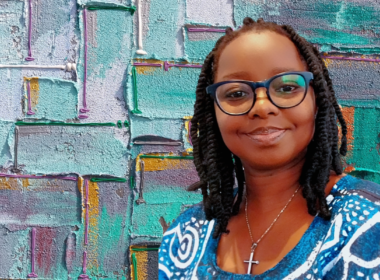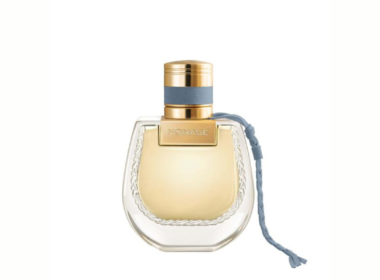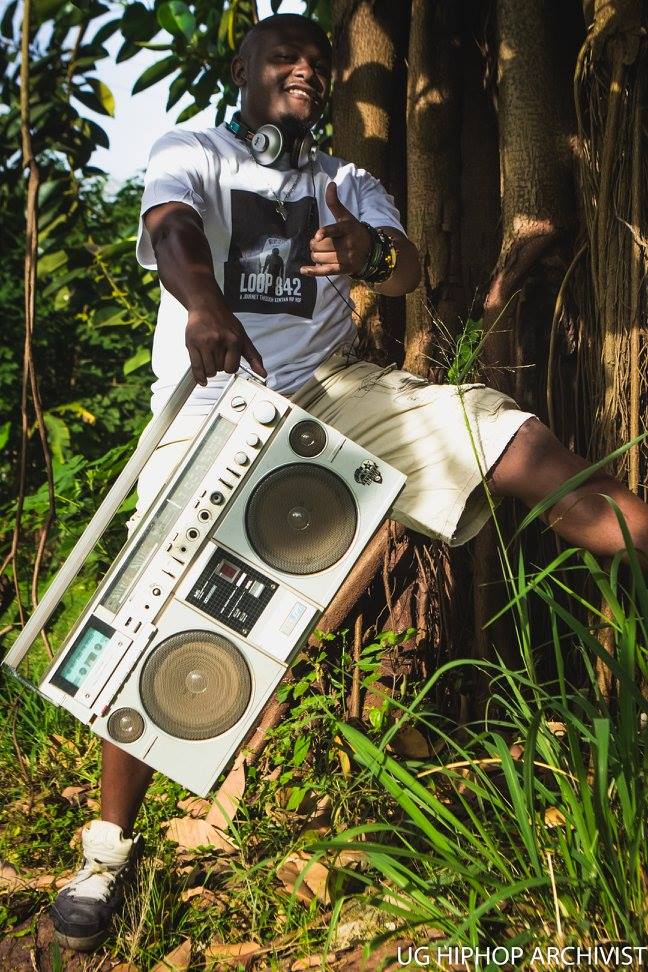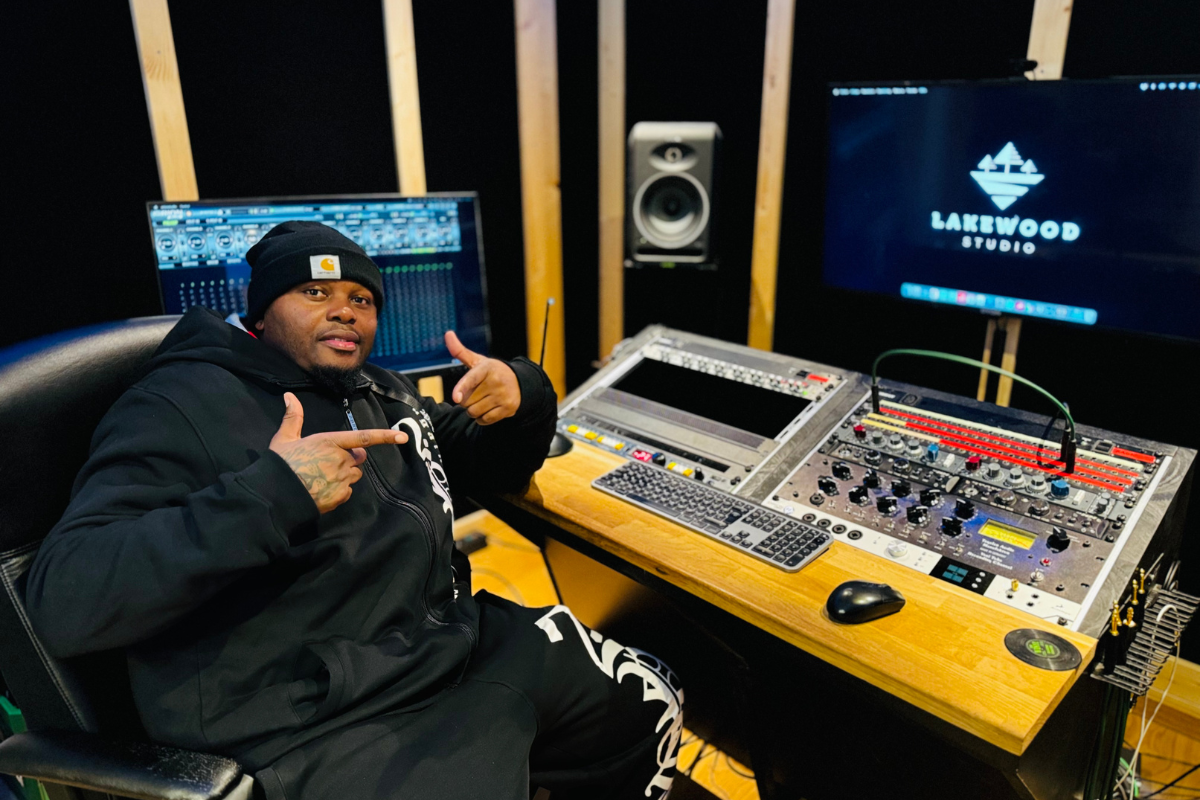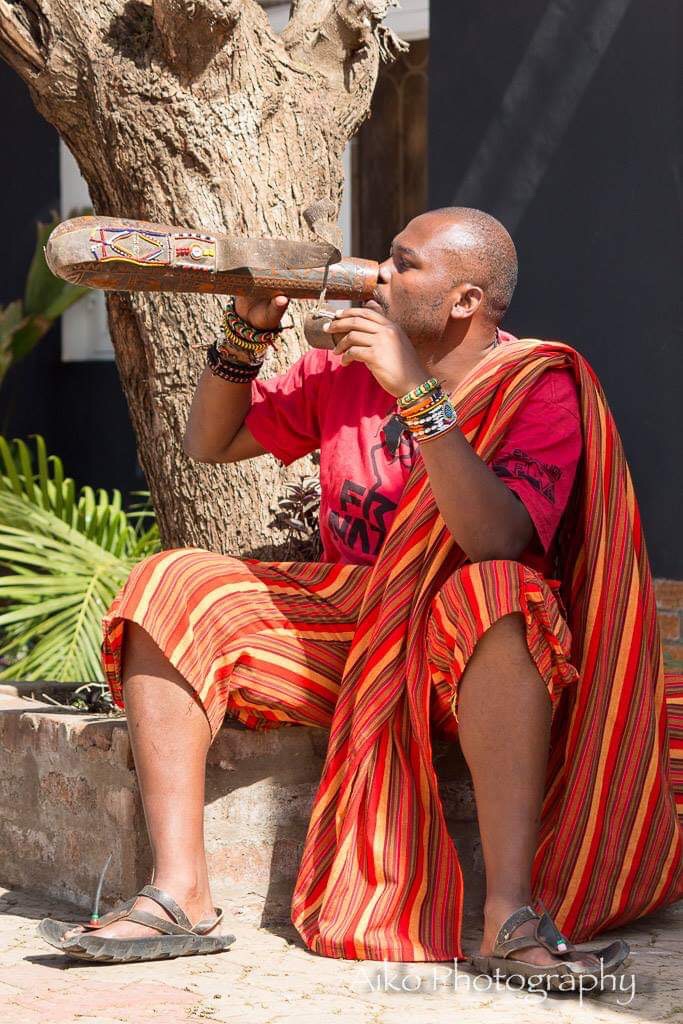Jay Maumau, a hip-hop artist from Kenya, is transforming the narrative of African youth through his powerful music. Known for using hip-hop as a tool for social change, Jay reflects on the 2007-2008 post-election violence in Kenya and the role of music in shaping African identity.
Jay Maumau: I was actually born in Mombasa, Kenya, and spent most of my childhood with my grandfather. He was deeply into politics, and we often had long conversations about the progress of our country. He inspired me a lot—he was a teacher, and I even went to the same school where he taught.
Growing up in the eastern part of Kenya, particularly during my high school years, also had a big influence on me. We faced many challenges there, and I started developing a passion for being a voice for the voiceless, representing the people in my community. At the time, I was really into football, and people appreciated how I played. But I also had a natural talent for music. After class, we would have freestyle sessions, and that made me realise I could be more.
I knew I wanted to represent my community, and hip-hop felt like the right way to do that. I connected it to my roots, using the art of storytelling. My love for literature, especially Swahili, helped me develop a style of playing with words, creating stories, and expressing the realities of life through my music.
FAB: I can only imagine how intense it must have been, choosing between a career in football and music. And speaking of music, you have a deep connection to the post-election violence in Kenya in 2007 and 2008—along with other sociopolitical issues. Since then, has anything changed, and has your message evolved from those early days?
Jay Maumau: The post-election violence was influenced by what many of us were studying in high school at the time, especially in literature. We were reading works that aimed to awaken and enlighten young people about the issues facing our country. I remember one of the books, A Man of the People by Chinua Achebe, which painted a vivid image of politicians and their roles in society. We also had Kilio cha Haki in Kiswahili, which tackled issues of labour rights and the need to fight for fair treatment in the workplace. Additionally, there were books addressing the position of women in society.
These readings fueled a sense of revolution within us—an urge for change. The class of 2005, for instance, was filled with young people eager to make a difference in the country. But if you ask me whether things have improved since then, I’d say, unfortunately, not much has changed. In fact, in some ways, things have worsened.
Take the recent events, for example: young people have been taking to the streets to protest, hoping their voices would reach the president and the government. They’re frustrated by the lack of jobs despite completing university degrees. There was also strong opposition to the Finance Bill of 2024. It shows that the problems we faced back then are still present today, if not more pronounced.
Many young people are now leaving Kenya in search of better opportunities abroad, which shouldn’t be the case. Our youth shouldn’t have to leave their country to find greener pastures elsewhere.
FAB: So it seems that not much has changed since 2006 and 2007?
Jay Maumau: Exactly. And it’s not just Kenya; this is happening all across Africa. Nigeria, for instance, has also faced its own share of challenges. It’s a widespread issue.
More Like This:
Hip Hop and Fashion: the 4 the most remarkable collaborations
Rolling Loud Europe – Who said Hip Hop is dead?
FAB in Africa: Does Fashion Have a Place In Kenya?
CountryWizzy Takes Europe by Storm: Electrifying Debut at Afriques Festival
MC Wang Jok: The Melodic Guardian of Acholi Culture, Preserving Traditions through Music
African Identity in Hip-Hop: Jay Maumau’s Vision for Future Generations
FAB: You’ve mentioned that art and culture shape how people see the world. So how do you think hip-hop is shaping the future of African identity?
Jay Maumau: Well, hip-hop, in my opinion, isn’t always in the media spotlight, but it holds a significant message. It speaks to what’s happening in our communities. Hip-hop has become the voice of the voiceless. It reflects society and helps create leaders and builders. When you look at many African communities, you’ll notice that artists are constantly expressing the struggles, hopes, and realities they experience daily.
In fact, there’s a rapper from the U.S. who once said, “African hip-hop is the future.” This is because we have artists rapping in multiple languages, from Cape Town to Cairo, connecting with the youth across the continent. Hip-hop movements are bringing young Africans together, uniting them through a shared narrative.
For example, I’ve initiated projects like Africa Is Now and Hip-Hop Beyond the Mic, aimed at bringing African youth together. I’ve traveled to Uganda and Tanzania, where we launched the Back to the Source project. These efforts help young people understand their community’s potential and realise that their music isn’t just for entertainment; it can be a powerful tool for social change.
We’re combining hip-hop with initiatives like farming and entrepreneurship. In Uganda, for instance, many young people are involved in both hip-hop and agriculture. They have access to fertile land and realised they can merge their passion for music with farming. When I visited Tanzania, one of my friends was only focused on music. But I encouraged him to think broader, and today, he calls himself a “musical farmer.” He raps and farms, growing his venture to the point where he now produces dairy products from cows and pigs.
So while hip-hop allows him to be the voice of his community, it’s also helping him push forward tangible projects on the ground. It’s a great example of how we’re using hip-hop to educate people about their potential and their resources.
Using Kiswahili in Global Hip-Hop: Why Jay Maumau Stays True to His Roots
FAB: Speaking of language, your lyrics are mainly in Kiswahili, which is fantastic. But how important is it for you to use your native language in your music, especially when you’re aiming to appeal to a global audience?
Jay Maumau: First, I’d say that the global audience craves something authentic. They appreciate originality. I do try to mix in some English to broaden the appeal, but when it comes to delivering my core message, Kiswahili allows me to express it best. You can truly connect with people through your native language because many around the world value their own languages deeply. For instance, in Europe, if you don’t speak German, you’re expected to learn it. There’s no shortcut or excuse.
As Africans, it’s time we also start valuing and promoting our languages. We need to push them out there proudly. Look at Afrobeat, for example. It’s largely in Pidgin English, something rooted in Nigeria, and it’s taken the world by storm through its authenticity. This shows the power of embracing and valuing what’s ours.
As Chinua Achebe once said, it’s time we start appreciating our homegrown treasures. For too long, we’ve imported and glorified things from the West, but we have so much of our own to offer. Our culture, our language—they’re powerful. For example, Afrobeat didn’t conquer the world just with music, but with culture as well. In Europe, Nigerians proudly showcase their food, their traditional attire, and of course, their music.
All of these elements—food, fashion, music—work together to bring African culture to the global stage. You see footballers talking about fufu now, and Europeans are aware of it. That’s culture in motion. We, as Africans, need to dress in our traditional styles, embrace our brands, and stop over-relying on Western labels. Take the Masai Kikoyo or Kitenge fabric, for example. Louis Vuitton rebranded it but kept the original fabric. Our culture is rich, and it’s up to us to showcase it to the world.
Similarly, we need to treasure our languages. Just as you can’t access certain job markets in Europe without learning the local language, the same should apply in Africa. To access opportunities, people should know Kiswahili or other local languages. We must value what we have.
Even here in Europe, when I perform my hip-hop in Kiswahili, people are intrigued. They want to know what I’m saying, and they’re drawn in by the uniqueness of it. West African artists tell their stories in their languages, and they’re able to connect with the world. They’re now headlining festivals across Europe because of their authenticity.
FAB: How do you foresee the collaboration between hip-hop artists and fashion designers, especially from East Africa? Typically, when people think of hip-hop, they imagine urban streetwear—Timberlands, baggy jeans, and the like. But what about someone dressed in traditional Masai attire? Do you see these two styles working together?
Jay Maumau: Absolutely. It works, and it creates magic. I once performed while wearing traditional African attire, and I always dress in something that represents my heritage. It gives you a unique identity.
When you dress in African wear, you’re telling your own story. You’re showing the world where you’re from, and you’re embracing your culture. This is who I am, where I come from. And it’s something we should take pride in.
Take a look at the global scene. You’ll see people all over wearing our traditional bracelets. Celebrities around the world wear them, but many Kenyans don’t see the value in it. They don’t understand the significance of wearing something like this and how it connects to a bigger picture.
Let me give you an example. Many celebrities wear flashy chains that look impressive but are often just for the camera. Those chains might cost €20. Meanwhile, this bracelet, made from the African oak tree, might cost around €50. But if I wear it, people might think I can’t afford a diamond chain, even though it’s far more unique and authentic to me.
Combining hip-hop and fashion is key because fashion is one of the essential elements of hip-hop. It’s about expressing who we are through how we dress. KRS-One’s The Gospel of Hip Hop expanded on the original elements of hip-hop to include street fashion—how we wear our clothes, how we present ourselves.
To stand out, we can’t keep following the same trends of baggy jeans and Timberlands. We should incorporate our own style. For example, the sandals made by the Masai from recycled tires. I have a pair here in Europe, and whenever I wear them, people are fascinated. They say, “Look, this guy is wearing sandals made from tires!” That’s how hip-hop and fashion can come together.
By combining African attire with hip-hop style, you don’t have to stress about big brands like Nike. With African fashion, you can mix and match and still stand out. This is what I believe—by wearing our traditional clothes, we’re telling a story, showing who we are.
Unfortunately, many big brands try to suppress African designs because they know there’s competition. If I want my brand to succeed, I’ll push down others. But if you look closely, many of the world’s most successful fashion designers are inspired by Africa.
All these big brands! They’ve been drawing inspiration from African culture and design for years.
FAB: You’ve been described as a “human rights MC” and a “hip-hop crusader”—quite powerful titles, if you ask me. How do these labels sit with you?
Jay Maumau: I think from my perspective, the people who fought for liberation in Africa came from communities, and they weren’t politicians. They were leaders and builders.
So, I see myself as a leader and a builder too. I don’t have to be a follower, you know? Having these titles means that I’m telling my own story. I’m standing out, taking on the role of a leader and builder in my community, and I’m happy with that.
I’m glad I’m not positioned as a politician. Politicians often play with words to please people and gain support. But being a leader and a builder means shaping society and guiding people towards a better future.
We should all be leaders and builders in our communities. For me, these are just titles. What matters most is seeing a society that loves Africa, takes pride in who we are, knows where we come from, and recognises our potential. Because, truthfully, we are blessed people. But we’ll only see our true potential if we elevate our collective self-esteem. It’s more than just personal self-esteem; it’s about raising the esteem of our entire race.
We need to start appreciating, motivating, and celebrating each other as Africans. That’s the only way we’ll achieve what we want as a continent. My goal has always been to use music to show the world the greatness of Africa. Too often, we’re perceived as weak, poor, or less capable. But that’s not the reality.
The global image of Africa, especially in places like Europe, is one of poverty and struggle. But the truth is, we have so much strength and potential. Let me tie this back to fashion, for example. Many brands try to sell products like wigs or skin lighteners, pushing the idea that our natural features—like our hair—are undesirable. They’ll say nappy hair is “rough,” encouraging people to buy products to “fix” it.
When you go to a store, you’ll often hear salespeople compliment you, telling you how great you look in these products. These compliments make you feel accepted, and so you keep coming back. But we’ve been programmed to dislike our natural selves, to reject our own beauty and heritage.
We need to break free from this mindset. We should walk proudly, knowing that we are the descendants of the greatest civilisations the world has ever known. The problem is, most of us don’t study or appreciate our cultures, and that’s our biggest challenge.
But there’s a wind of change blowing across Africa. From West Africa to the south, we’re seeing a shift. And while some forces may try to stop it, they can’t because this change is inevitable.
Hip-Hop as a Voice for the Voiceless: Jay Maumau’s Community Impact
FAB: Your foundation, Africa is Now, and the Hip-Hop Beyond the Mic movement have been doing remarkable work at the grassroots level. What has been the most rewarding part of that journey for you so far?
Jay Maumau: I’d say it started back in 2015, when I was honoured by the former Chief Justice of Kenya for using hip-hop to advocate for social justice. After creating the Hip-Hop Beyond the Mic movement, we brought creatives together and gave them a platform to express themselves.
If I’m not mistaken, many of the artists who are prominent in today’s music scene in Kenya—and across Africa—started from that foundation. These young people embraced what we were teaching back then and used their music to connect with people and spread messages that resonated.
I don’t focus too much on my own personal success, but what’s fulfilling is seeing how art can bring the youth together. It opens their minds, enlightens them, and empowers them to question the status quo. Growing up, we’ve lived in societies where questioning authority wasn’t encouraged. Our voices were silenced. But through hip-hop, the youth now have a chance to stand up and speak out about what’s happening, even challenging the system.
These are big strides, especially considering how society often reacts when someone speaks their mind. They don’t waste time in silencing you, either by overshadowing you with the media or pushing you toward the commercial scene. You’re told, “Yeah, what you’re doing isn’t popular. Maybe try something more commercial.” And that’s how you’re silenced—indirectly but effectively.
It’s just their way of saying, “We don’t want to hear what you’re saying.” They push you to glorify other things to appeal to the masses.
But I think Africa is at a critical moment, a time where we need to open minds and eyes, helping people understand what’s happening behind the scenes.
FAB: That’s deep, and it seems like your work has caught the attention of some pretty influential players, like the Supreme Court of Kenya. How did that collaboration come about?
Jay Maumau: To be honest, when I first received the email from the Supreme Court, I thought it was a scam. I ignored it for a few hours. But then, the Chief Justice himself called me, inviting me to perform and saying I’d be honoured for using my music to champion social justice. I was like, “Wow!” It was pretty surreal.
And the song they invited me to perform? It was from 2010, five years earlier. So the lesson is patience. Many of our people lack patience, but you never know who’s listening or watching your work.
In Africa, there’s this mentality that people see what you’re doing but won’t acknowledge it until they absolutely have to. It’s like when something finally chokes them, and they’re forced to spit it out, that’s when they start appreciating and celebrating you.
But they see it. They see that something is happening. It’s the same with our ancestors, who fought for Africa’s liberation. They started from small communities, and now their names are remembered across the continent. That’s how they were able to connect and bring about real change.
FAB: Looking ahead, what’s your goal for your music and your foundation?
Jay Maumau: Right now, I’m working on building an art centre in my hometown in Kenya. I want it to be a place where people can come, learn, and connect.
I don’t focus too much on becoming a massive hip-hop star or performing on the world’s biggest stages—those opportunities come naturally. My main goal is to bring as many people along with me as possible. I want them to take pride in Africa. Even when I’m performing in Europe, I’m always proud to represent where I come from.
That’s my greatest pride—going on stage and showing the world that I come from Africa. There’s a narrative out here that we don’t have “big brains” or key players, but that’s not true. It’s a narrative we have to work hard to change.
I’m always working to help young Africans realise they don’t need to come to Europe to achieve their dreams. They can make it from where they are.
Fusing Music, Agriculture, and Activism: Jay Maumau’s Projects in Uganda and Tanzania
FAB: In Africa, as you’ve mentioned, there’s immense pressure for artists to succeed—and today, success is often measured by financial gain. To achieve that, artists feel they need to go global and appeal to the Western world, Asia, the Middle East, and beyond. How do you manage to stay above all that pressure?
Jay Maumau: I made a conscious decision early on. I can tell you for a fact that Africa Now—my movement—doesn’t even have a bank account to this day. We never sought financial aid from the West, nor did we ask for handouts. I’ve always believed that when someone gives you money, they expect you to follow their agenda. That’s why I always encouraged us to come together and rely on our own resources, instead of waiting for external help.
In fact, I never focused on teaching people to just go to studios and record music. Waiting for the “fruits” to come from just music wasn’t realistic. I taught them how to engage in other activities, like farming. We could go to the market, sell our produce, and reinvest those earnings into our passion for music. For instance, I’d tell them, “Buy a goat today—by December, you’ll have more goats and the means to finance your recording sessions.”
Recording music alone doesn’t guarantee success. You can record as many songs as you want, but it pays off much later. Look at all the streaming platforms—they don’t pay nearly as much as people think. It’s not until you start getting shows, maybe two or three a month, that you really start to earn anything. And even then, it’s often not enough to support yourself and a family.
This is why I’ve always said that Hip-Hop Beyond the Mic requires us to think bigger than just holding the microphone. How can we combine our talents with the resources available in our communities? Some areas have fertile lands—how do we help the youth realise the potential of these resources and put them to good use?
Unfortunately, in Africa, our education system often misses the mark. Ask someone about agriculture, and they may not fully understand its importance. Why not call it what it is—farming? It’s simpler and easier for young people to grasp. We need to focus on the fact that our lands are fertile and we can farm year-round. We could be encouraging young people to start vegetable farms or build greenhouses, but instead, many of them are focused solely on becoming celebrities.
But what’s the point of being a celebrity if you don’t have money or any real impact? You can wear nice clothes and fancy shoes, but beyond that, what are you doing? Appearing in magazines, on television, and in newspapers is great, but it doesn’t mean much if you’re not creating real change.
I realised this after spending six months in Nairobi doing media tours. I was on every TV and radio show, but at some point, I asked myself, “What’s next? What do I actually have to show for all this?” I had spent all my money on these tours and appearances, and while my name was big in the streets, I was left with nothing to show for it. People wanted to take pictures with me, but I started questioning, “How am I truly impacting their lives?”
That’s when Africa Now came to life. That’s when Hip-Hop Beyond the Mic became more than just a name. It wasn’t about me having a big name; it was about realising the potential in our communities. If we come from a place where fishing is our strength, then why not fish, make a living, and then go to the studio to make music?

FAB: If you had to choose, which would you say is more challenging—creating music that resonates with people or inspiring them to take action?
Jay Maumau: The biggest challenge is creating music that inspires people to take action. Why? Because it’s incredibly difficult to convince people to change or act. It’s like being a preacher—you have to find ways to engage them. That’s why preachers often resort to miracles or dramatic gestures to captivate their audience. They bless water or tell you, “This is where the miracle is,” to appeal to you.
The real struggle is getting people to act. That’s where the challenge lies. But making music that people enjoy? That’s much easier. All you have to do is sing what they want to hear, and they’ll love you for it. For those of us who speak the truth, it’s different. We aren’t always embraced because we tell it like it is. You can either like it or hate it, but we speak the facts.
Now, if I wanted to appeal to everyone, I could easily increase my numbers. I could go to the studio and record songs praising women, talking about sex, or promoting alcohol—the kind of music that lets people escape and have fun. They’d love me for it because that’s what many want to hear. But our society is under a lot of stress, and most people don’t want to take action. They prefer to relax and stay in their comfort zones.
This is a major problem in Africa. Most people don’t want to lead or take responsibility. As artists who try to tell real stories, we face significant challenges. That’s why genres like hip-hop aren’t always embraced by the media. We’re speaking to people who don’t want to listen, who often don’t even know their own rights.
It’s similar to what happened in Kenya when someone was asked, “Have you read the new constitution? Do you know your rights?” The person responded, “As long as Raila, the former prime minister, has read it, it’s fine with me.” This is the mentality we’re dealing with, and it reminds me of what Mandela said about the long walk to freedom. It’s going to take us a long time to achieve real change if people think like that—relying on someone else to do the work for them.
In Europe, children start learning their rights in kindergarten. By the time they’re 15, they can express their opinions confidently. In contrast, I once saw a child in Africa try to talk back to their mother, and the reaction from most parents was harsh. They said, “My child would never talk to me like that. I would have slapped them.” But here’s the thing—many of us grew up in societies where we were never given the chance to express ourselves. We were expected to keep our problems inside and never speak up.
Think about it. How many of us ever heard our parents say, “I love you”? How often did we say it to them? In some communities, if you told your parents you loved them, they’d think something was wrong with you. Now, imagine raising a child in that kind of environment. How do we expect them to value love or embrace it as important when they grow up?
Our programming starts from a young age, and it shows in the way we’re raised. Mothers are often the first teachers, but what happens when a mother constantly tells her child, “You’re foolish, just like your father,” or “You’re worthless”? The child’s role model becomes their father, who has been reduced to being called a dog. What does that do to the child’s self-esteem? It destroys it before they even have a chance to grow.
This is why we, as leaders, need to position ourselves to speak out. We need to tell people, “This is wrong. This isn’t right.” The same applies to politics—people listen to what politicians say, accept it without question, and follow blindly. This is how we’ve been programmed since childhood, and it’s the reason we struggle to differentiate between true leaders and mere politicians.
That’s the challenge we face. We’ve been conditioned from childhood to accept things without question, and that’s the reality we need to change.
FAB: It’s crucial to address this clearly. Many people want to become conscious artists or activists but struggle with societal conditioning. How can they break free? What’s one piece of advice you would give them on their journey?
Jay Maumau: My own awakening began with lessons from my grandpa, but it wasn’t until 2015 that I embarked on a personal journey to understand who I am and where I come from. I had to start from scratch, rejecting the indoctrination of traditional education. Schools often impose their own perspectives, shaping how we view ourselves and the world.
My journey involved reconnecting with my spirituality. Unlike religion, which often seeks a deity outside ourselves, spirituality is about recognising the divine within. It’s about understanding that we possess the power to shape our lives and manifest our desires. Connecting with nature was key to this realization. We are made from stardust and soil, and just as stars shine, we should let our own light shine.
After this journey, I met Professor Kwampena Ashanti from Ghana, who highlighted that true freedom for Africa lies in returning to ancestral spiritual practices. This insight deepened my quest for purpose and my role in society. I realised that our ancestors’ wisdom is vital, and modern technology often disconnects us from our roots.
In Arusha, I led a group of young people through activities like sitting under waterfalls to connect with nature. I encouraged them to express their challenges openly. This process was transformative. Many reported significant changes in their lives, discovering new roles and purposes within their communities.
Our ancestors understood the power of sacred natural places, such as trees and rivers. For example, the Nile is more than a river; it holds the blood of our ancestors who fought for us. Westerners often visit these natural sites to recharge, recognising their significance. They understand that these places hold energy and wisdom.
Similarly, African artefacts held in Europe are not merely objects; they represent our spirits and power. Reclaiming these artefacts is essential for reconnecting with our heritage. Returning them to Africa will help us reclaim our strength and wisdom.
FAB: Thank you so much, Jay Maumau. It’s been enlightening to hear your perspective. Your words have been a powerful reminder of the importance of reconnecting with our roots.
Jay Maumau: Absolutely. The modern world often pushes us towards urban living and technology, creating illusions of progress. True advancement isn’t about plastic buildings or artificial environments. Ancient technologies and practices had their own wisdom. For instance, traditional African houses remain cool without air conditioning, and simple methods can keep water cold without refrigeration. These methods are deeply connected to nature.
We must question our current trajectory and consider the impact of our technological advances. Are we truly advancing, or are we disconnecting from nature and harming ourselves? It’s essential to reevaluate our path and seek a balance between progress and preserving our natural connections.
Jay Maumau: The sense of connection to nature is being lost because the system is pushing us towards urbanization. Cities are portrayed as the ultimate goal, but they often present an illusion of progress. Similarly, there’s a push to embrace the metaverse as the future, creating a false reality and overshadowing the natural world. We are encouraged to adopt these illusions while simultaneously destroying nature and focusing solely on technological advancement.
Many people believe that our current era is the pinnacle of human progress. However, this isn’t true. We are part of a digital generation that, in many ways, is regressing. Look at ancient civilisations and their architecture, some of which dates back 2,000 years or more. Compare that with today’s use of plastic in construction. While many see this as progress, we are actually losing our connection to nature. Modern houses, often built with materials like plastic, can feel oppressive, almost like living in a casket. In contrast, traditional African houses, made from natural materials like grass, stay cool without air conditioning, and simple clay pots can keep water refreshingly cold.
This stark difference highlights how modern conveniences don’t always equate to real progress. For example, ancient Chinese porcelain, that dates back 200 years, still surpasses the craftsmanship we achieve today. We are not necessarily advancing but losing touch with our roots and the wisdom of previous generations. We need to question where we are heading and acknowledge that our current path may lead to our own destruction.
FAB: As a child, I was very outspoken. My family worried that I might become involved in politics, which could be dangerous in my country. Should we accept that we are already programmed by how we have been taught to live?
Jay Maumau: Many of us are indeed programmed by societal and religious norms, living in fear of deviating from established rules. Religion, for example, often dictates how we should live and discourages independent thought. This fear is ingrained early, leading people to conform rather than think for themselves. When religions were introduced to Africa, they often came with threats of punishment for non-compliance, creating a society where independent thinking was discouraged.
As a result, many cultures have developed in ways that limit personal expression and discourage questioning. Young people in Africa, for instance, are often taught to follow orders rather than voice their opinions. We need to shift this mindset by teaching children to speak up and overcome their fears. Fear is the only thing that we are not immune to. Fear is one of the greatest obstacles to personal growth, and everyone experiences it. The key is to acknowledge and address it, rather than let it control us.

Fun Zone: Fast Five
FAB: If you could pay one song every time you walked into a room, what would it be?
Jay Maumau: My song.
FAB: Where is the favourite place you love to visit in Kenya?
Jay Maumau: The Indian Ocean.
FAB: What’s the easiest way to make you laugh?
Jay Maumau: If you tell me something conscious, I will laugh.
FAB: Beach or mountain vacation?
Jay Maumau: Only the beach is the best.
FAB: What would you title this chapter of your life if it were a book?
Jay Maumau: Leaving my legacy.
PhotoCredit: Kiz/Stefan Pajman, Africa is Now Lino, Miha4real, Aiko Photography
